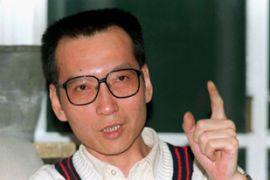Top China dissident goes on trial
Verdict in trial of Liu Xiaobo due on Friday after trial lasting just two hours.

Western diplomats in Beijing had requests to attend the trial rejected, while other key Chinese dissidents were also reportedly warned to stay away.
Dozens of police ringed the courthouse on Wednesday as Liu’s trial was set to get underway.
If convicted, Liu faces a maximum of 15 years in prison. He has already been jailed for 21 months for participating in the Tiananmen protests.
The case against Liu centres on his co-authoring of a petition called Charter 08, which calls for the protection of human rights in China and reform of the country’s one-party communist system.
Petition circulated
According to China Human Rights Defenders, a network of activists, the petition had been widely circulated online, and was signed by more than 10,000 people, including other dissidents and intellectuals.
| Who is Liu Xiabao? |
|
|
It specifically calls for the abolition of subversion in China’s criminal code – the very crime with which Liu has been charged.
Bao Tong, a former aide to ex-Chinese leader Zhao Ziyang, who was jailed for sympathising with the Tiananmen protests, also signed the petition.
“I insisted that I am a part of this case. If Liu Xiaobo is to be tried, then I should be tried as well,” he told AFP news agency.
“If he is found guilty, this will be a problem because it will mean that the freedom of speech and freedom of expression guaranteed by the constitution are fake.”
Liu is fighting the charges but has no plans to appeal if the verdict goes against him, his wife, Liu Xia, said ahead of Wednesday’s trial opening.
“With a government like this, a government without principles, there is nothing you can say,” she said.
Access barred
Gregory May, a political officer with the US embassy in Beijing, said he and other diplomats had been refused access to the trial.
“We were told all the passes were given out. We understand no one can get
in,” he told reporters.
|
“Liu Xiaobo’s detention and trial show that the Chinese government will not tolerate Chinese citizens participating in discussions about their own form of government” Sam Zarifi, |
“We call on the government of China to release him immediately. We urge that any judicial proceedings be conducted in a fair and transparent manner.”
Nicholas Weeks, the first secretary of the Swedish Embassy, said diplomats from at least 15 countries were outside the court.
Human rights groups say the sensitive trial has been deliberately timed by Chinese authorities to coincide with the Christmas holiday period, in the hope that international media and foreign governments will overlook the case.
The subversion charge faced by Liu is often brought against those who voice opposition to China’s ruling Communist Party, and rights groups have accused the government of abusing such charges to silence its critics.
“Liu Xiaobo’s detention and trial show that the Chinese government will not tolerate Chinese citizens participating in discussions about their own form of government,” Sam Zarifi, the director of Amnesty International’s Asia-Pacific Programme, said in a statement.
“After Liu Xiaobo, more than 300 Chinese scholars, lawyers and officials who proposed a blueprint for improving their political system may be at risk, as well as nearly 10,000 signatories.”
 Liu Xiabao is a literary critic, a former professor of literature and human rights activist.
Liu Xiabao is a literary critic, a former professor of literature and human rights activist.